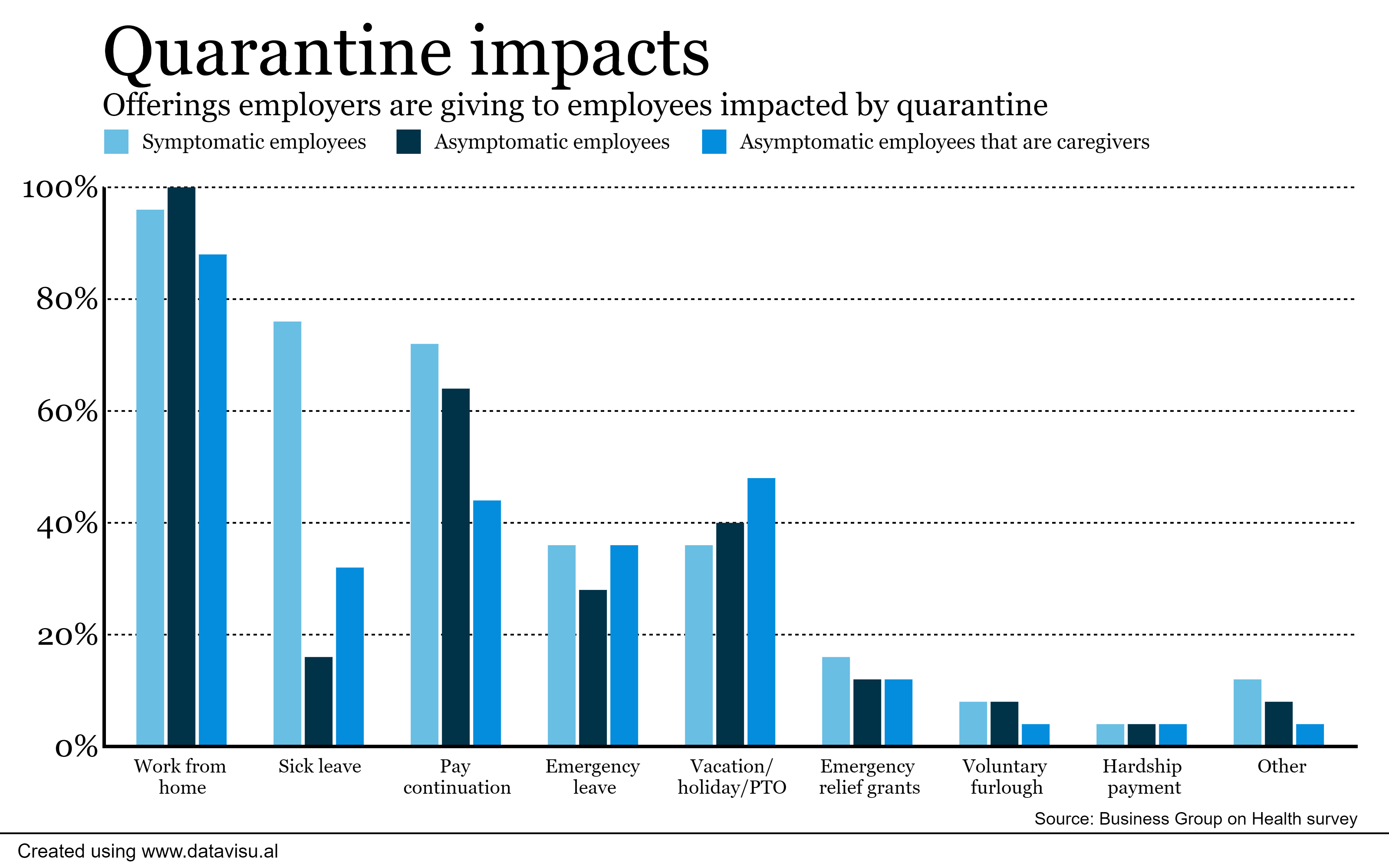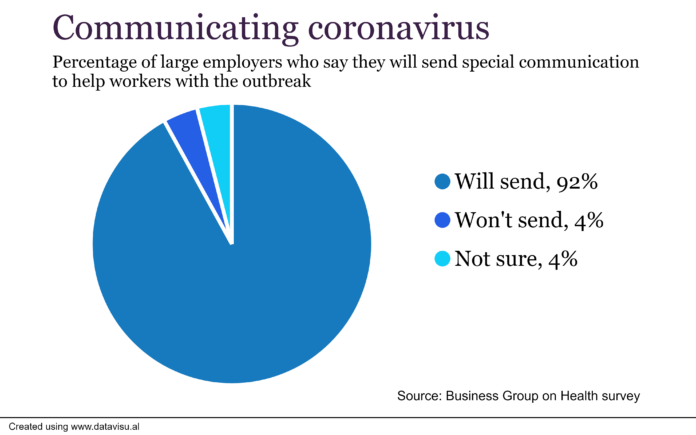As if facing the typical concerns about employee health and wellbeing are not enough for employers, the fast-changing coronavirus scenario unfolding globally has become the type of nightmare that requires nothing less than a multifaceted approach.
“Now is the time” for businesses and other entities to begin preparing for possible spread of COVID-19, also known as coronavirus, said Nancy Messonnier, director of the Centers for Disease Control and Prevention’s National Center for Immunization and Respiratory Diseases, in a conference call on Feb. 25.
More specifically, Messonnier suggested that “businesses can replace in-person meetings with video or telephone conferences and increase teleworking options,” among other precautions. She added that the “potential public-health threat posed by COVID-19 is high, both globally and to the United States.”
As of Tuesday, the New York Times reports more than 100 cases in the U.S. across 15 states, with six deaths. Globally, more than 90,000 have contracted the illness.
Around the world, employers are scrambling to decide just how to help ensure employees–no matter where they work or travel for business–are as safe as possible with fears of a pandemic growing.
Related: ‘Handshake-free’ meetings and other coronavirus precautions
“Companies have a moral and legal obligation to look after employees–whether it’s mitigating travel risk or looking after their general health and wellbeing,” says Mark McSpadden, vice president of global product strategy and experience at American Express Global Business Travel, which manages more than $35 billion of the world’s business travel each year.
“Travel plans and business meetings are disrupted by health issues, geopolitical unrest, bad weather and aircraft technical issues around the world every day,” he says, adding that, with fast-moving, fluid disruptors like coronavirus, employers are revisiting their business-travel policies and planned meetings and events schedules in real time to keep pace with travel advisories and restrictions.
“When business trips and meetings are being postponed or cancelled, providing timely and accurate communication with travelers and event attendees is crucial,” McSpadden says.
On the information front, a new survey commissioned by Prudential of more than 2,000 adults found that Americans see employers as having a dual role to play in addressing risks associated with the virus, both in protecting their health and wellbeing and as trusted providers of information, including resources to help manage its financial impact.
The research found that 43% of Americans say they are concerned they will personally contract coronavirus, while 45% are concerned about an outbreak that requires quarantines and limits their ability to work for several weeks.

The survey also revealed that, despite a low incidence of the virus in the U.S. to this point, many Americans have already begun to change their day-to-day habits and behaviors. For example, one in five American adults say they are avoiding public spaces with large crowds, such as movie theaters, restaurants and shopping malls. Fifteen percent are avoiding public transportation, and 12% report staying home from work if they are feeling sick.
See also: Coronavirus: HR’s role
More than half of those surveyed (54%) believe that employers are responsible for protecting the public during this kind of potential health crisis. What’s also striking is that Americans say they trust their employers (45%) slightly more than they trust the news media (44%) for information about crises, such as the coronavirus outbreak.
“Communication is key,” says Sharon Smith, Prudential’s chief medical officer, noting that there are three key steps employers can take to help support employees: prepare for needs and questions; communicate regularly and often; and ensure consistent and accurate messages.
See also: Steve Boese: Navigating mergers, acquisitions and coronavirus
“Paramount to success is a health-emergency team that has representation across the company,” Smith adds. “The goal is to provide a safe environment that supports both employees and the business.”
According to a recent pulse survey from the Institute for Corporate Productivity (i4cp), a member-based nonprofit research firm that explores “next practices” in human capital, 30% of employers polled report having a “very high” concern about the coronavirus in their organization when it comes to considering employee travel decisions, while another 21% fell into the “high” category. Also, 71% said they have communicated with their workforce regarding coronavirus.
Lorrie Lykins, vice president of research at i4cp, explains that, as a researcher, her natural default is to lead with data, but she warns that doesn’t mean that a steady drumbeat of updates in “Twitter-time reporting” on the latest number of victims is helpful.
Related
“Being mindful of employee wellbeing means taking a holistic approach that includes communication that shares facts as needed about prevention from sources including the CDC, the [World Health Organization] and the [National Institutes of Health],” she says, adding that it’s also important to keep employees informed of corporate decisions, especially because some are being made in real-time.
Treating employees as adults and offering them the flexibility to make decisions about commuting/traveling–or not–whenever possible, sends the right message, Lykins says.
“There is a fine balance between being proactive in sharing helpful information with employees and generating anxiety,” she says. “It’s possible to over-communicate in situations like the one we are now in, which can unintentionally add to stress and even panic.”
Lykins will get no argument from Corey Stowell, vice president of human resources at Webasto Roof Systems Americas, a global Tier 1 supplier of roofing and heating systems to the automotive industry.
Webasto, which has operations throughout China (including in Wuhan, the original source city), directly handled coronavirus cases within the company’s Germany office in January. Stowell says it’s an experience that lends credibility to the organization as a whole, as both offices were able to come together and devise a number of “key things learned” to serve as models for other employers seeking preventative measures.
“Large, global or even regional organizations should maintain continuous internal contact to align on new developments, and knowledge share on employee feedback and how to best communicate new incidents as situations unfold,” Stowell says. “This has to be a joint effort, as a single person can’t lead an organization through this alone.”
Stowell advises the following in managing this quickly evolving virus and any potential employee impact:
- Focus: Address infected areas/regions and not the nationality of those involved.
- Educate: Explaining how the virus is contracted, what colleagues can do to prevent contracting and/or spreading the virus and where to go for more information are critical elements.
- Communicate: Knowledge is power, and communicating often will help put fears to rest. Be transparent so colleagues aren’t concerned that there is any concealment of key information, while also being careful to maintain and respect the privacy of any (possibly) infected colleagues.
- Build: Identify outside organizations that can comprise a network of experts with up-to-date resources for referencing and sharing. This will help address concerns from colleagues and allow for organizations to leverage the expertise of those on the frontlines to help compile accurate and credible information from key experts (CDC, WHO, local health department, hospital systems, etc.).
- Suspend: Call off global travel to infected areas as much as possible and bring home those who may be on the road. If someone traveling has experienced “Category 1” form of contact while in an infected area (per German research organization Robert Koch Institute), ask those colleagues to work remote for 14 days, which is the estimated incubation period for the coronavirus.
“HR’s role becomes notably more active and sensitive in this situation,” Stowell says. “Listen and let people address their concerns while displaying empathy and understanding, [and] help assess each case with care for the good of the whole organization.”
Stowell says the Webasto HR, communications and legal departments collaborated on direct, transparent and timely messages both internally and externally for global alignment. Also, a task force established in Germany, where the parent company is headquartered, sent aligned internal updates to all colleagues; the Americas region followed up with additional information tailored for the region. Regional information included about restricted travel to and from the region and updated health conditions of current infected colleagues.
Finally, after virtually speaking to the Webasto Germany office on the outbreak, leaders at Webasto North America promptly held a company-wide meeting to present coronavirus information to U.S. colleagues, in a transparent, face-to-face setting at its Rochester Hills, Mich., headquarters.
“We believe employers must focus on what is communicated in order to best inform and reduce panic situations–knowledge is power,” Stowell says.



